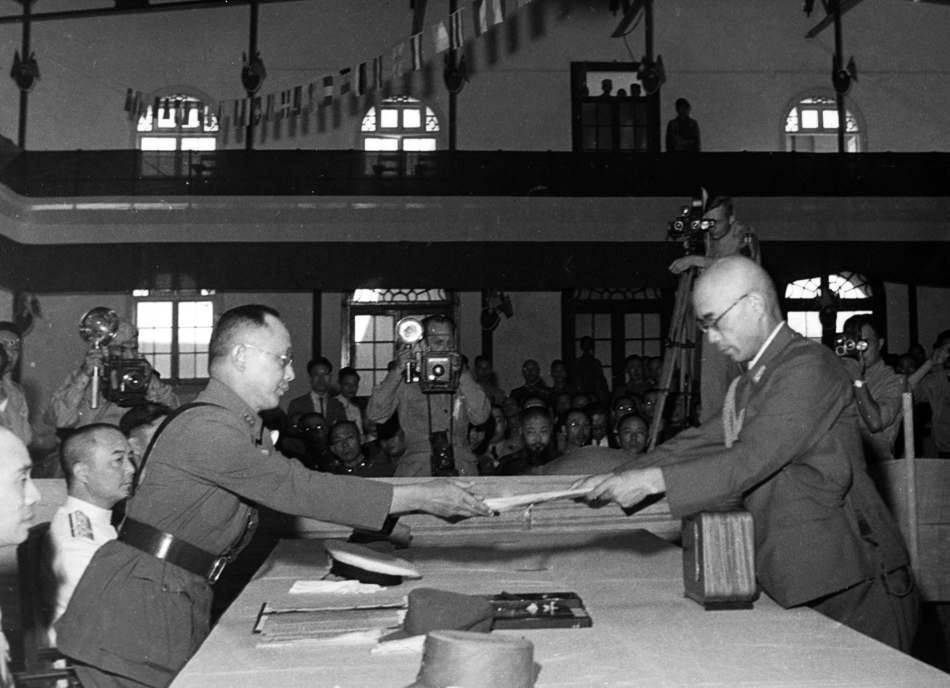Scholars urged to recognize China's contribution in WWII

General Mosaburo Kobayashi presents the Japanese Instrument of Surrender to He Yingqin, the commander-in-chief of the Chinese Army on Sept. 9, 1945 in Nanjing.
In Why We Fight, a documentary produced by the US military during World War II, China is described as an ally and acknowledged for its resistance against Japan for seven years prior to the United States’ entry into the war.
But the split between China and the West caused by the Cold War meant China’s contributions were largely overlooked in the official histories of Western societies.
“Western publications rarely bother to spare a few words about China’s wartime experience,” said Qi Shirong, professor of history at Capital Normal University.
He criticized Western academia for its nonchalance and prejudice against China at the Conference of History and Memory of World War II hosted by Capital Normal University on July 17.
Qi’s candid remarks were echoed by Mark Gilbert, a history professor at Hawaii Pacific University and former president of the World History Association. He said, “history textbooks in Western countries seldom mention China’s sacrifice and endurance in World War II." There is no justification for such deliberate obliviousness.” He made it clear that Western scholars have unappreciated China’s wartime contributions, and an in-depth reevaluation is needed.
Capital Normal University history professor Liang Zhanjun revealed that Eurocentrism is one root cause of such deliberate negligence. After reading through 15 encyclopedias of wars representative of Western scholarship, he discovered that battles fought in Europe and the Pacific region were depicted in full length in these works, whereas few ever mentioned China’s own military predicament, sacrifice and contribution.
Virtually every work portrays the China-Burma-India campaign in which the US and UK were the protagonists, but China is relegated to the role of a supporting actor at best.
After Japan’s surprise attack on the Pearl Harbor, it took six months for the US to recover from the traumatic loss and plan its retaliation. In 1942, the US launched a series of air raids on Japan and areas occupied by its army. Many US army aviators were forced to make emergency landings on Chinese soil when their aircrafts ran out of fuels. Local people fully understood that helping these aviators would invite ferocious retribution from Japanese troops and thus risked their own lives. Nonetheless, they helped aviators passing through the occupied areas to reach the southwest, where the Kuomintang government was still in control.
Though these stories might seem insignificant, Gilbert argued that theyhelp to paint a larger picture. As the military base of Allied powers in the Asia-Pacific region, China provided crucial support for their military actions. A large portion of the Japanese army was locked in seesaw battles with Chinese armies on Chinese soil. China’s geographical location was of strategic significance for the Allied victory.
“Authors of world history textbooks need to recognize China’s contribution to World War II,” Gilbert said.
He said World War II truly began with the 1931 Mukden Incident in China rather than the Nazi invasion of Poland. Moreover, Japanese authorities were forced to temper their military ambitions in light of the fact that the Chinese resistance kept a considerable number of troops occupied. It was because of this that Japan was unsuccessful in its attempt to invade India. Similar to the UK, China had struggled alone before the outbreak of the Pacific War. “It is enormously difficult for a country to fight on its own,” Gilbert said.
Much to the delight of Chinese historians, their appeals have gradually gained traction among Western academics. More and more overseas scholars have worked to reevaluate China’s wartime role in the past few years. According to Liang’s research, encyclopedias of wars recently published in Western countries have devoted more articles to China’s resistance campaign and provided accounts that are more detailed and objective. “It means that Western scholars are more willing to consult the research output of their Chinese counterparts as China’s strength and influence continues to surge in the years since the implementation of the opening-up policy,” Liang said.
Mao Li is a reporter at the Chinese Social Sciences Today.
